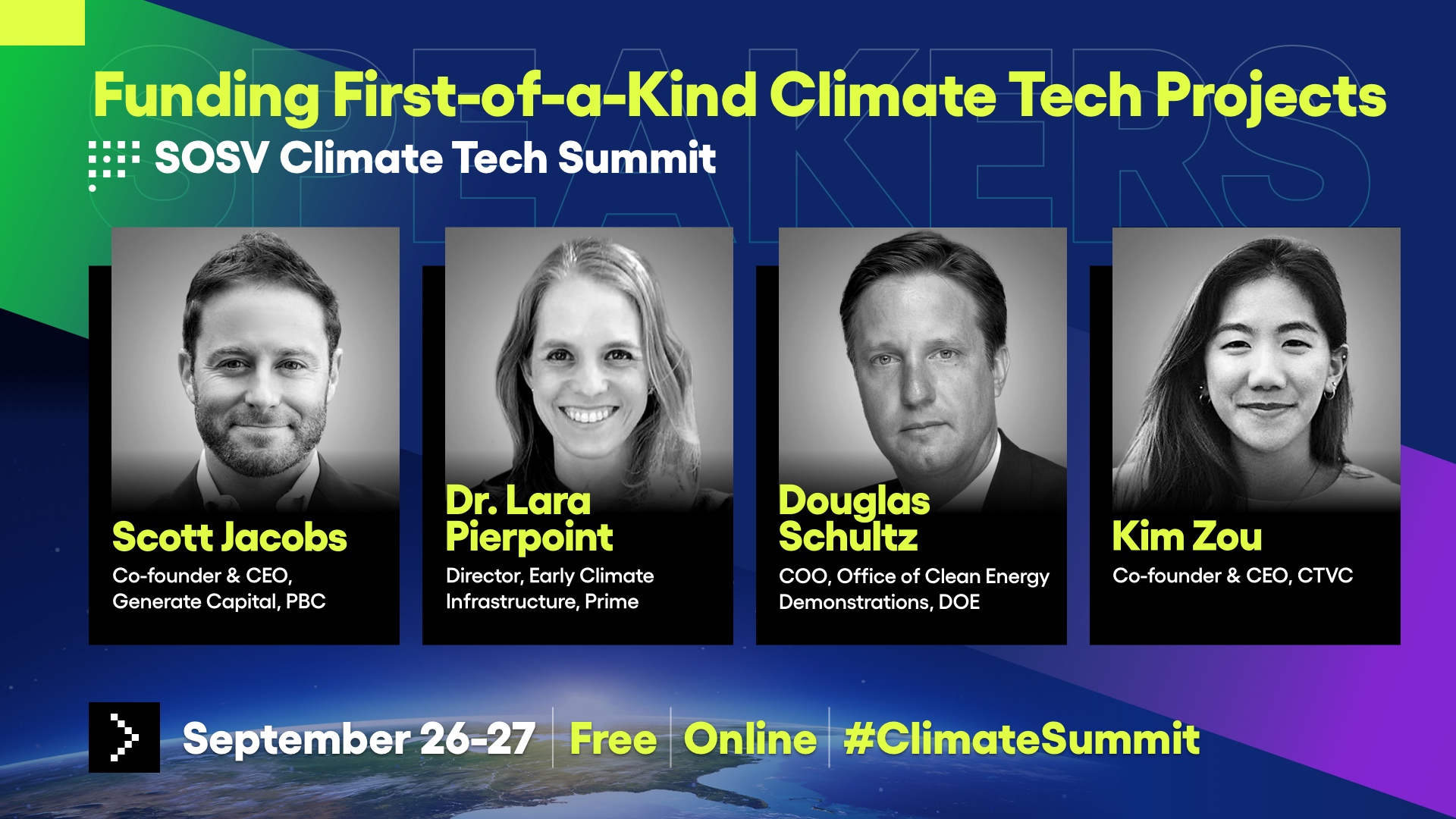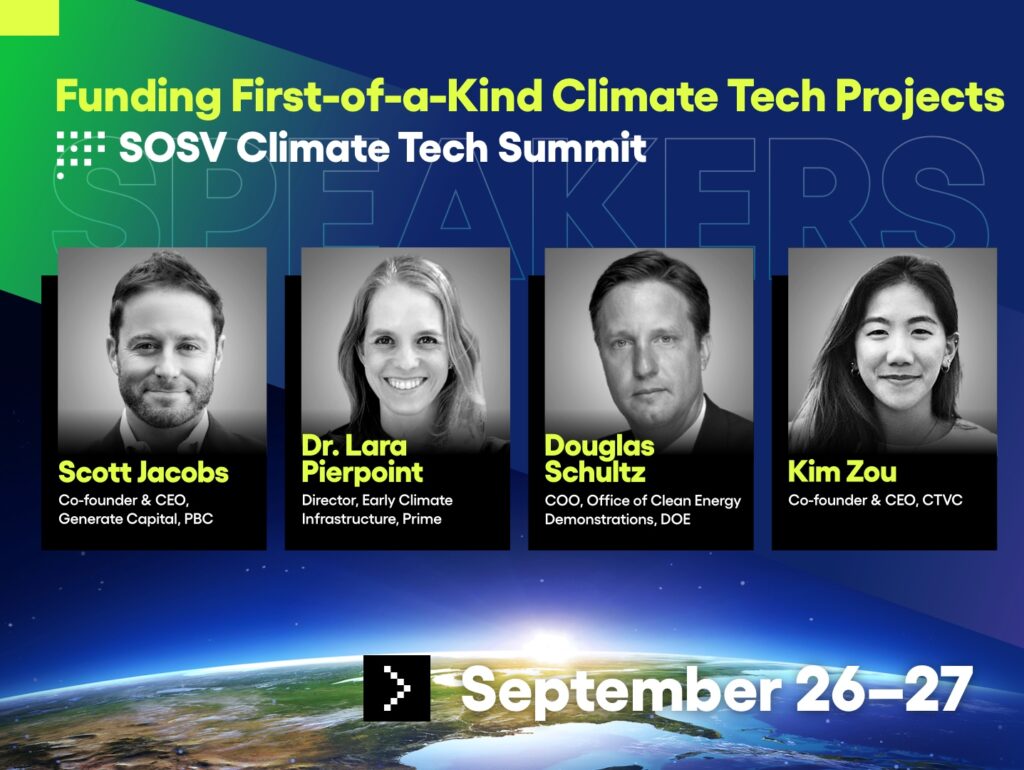
Climate tech, whether it’s renewable energy or cell-cultured protein, only makes a difference at scale, and scale is fast becoming the biggest challenge of all. Funding is widely available for early-stage ventures but relatively scarce for the first-of-a-kind (FOAK) plants and facilities that demonstrate scalability before commercialization.
The SOSV Climate Tech Summit (Sept 26-27 / free & virtual) hosted a panel of FOAK backers. Why did they get into this niche, and what do they look for—or avoid—in potential investments?
FOAK funding is hard to come by because the checks are too large and returns too low for VCs, while the risk is too high for project finance investors and banks, which prefer proven tech and predictable revenue streams. FOAK specialists seek to mitigate the risks associated with scaling pre-revenue, capital-intensive technology.
With mid-to-growth-stage climate tech funding down over 50% in H1 2023 according to CTVC, risk tolerance for FOAK is likely down as well. And a lack of FOAK capital could delay or prevent startups from ever making a dent in emissions. So, how should FOAK-stage startups navigate this funding environment? Three top FOAK players weighed in at the Summit.
Generate Capital is the pioneer in FOAK funding and calls itself the “one-stop shop for the Infrastructure Revolution.” The firm builds, owns, operates, and finances sustainable infrastructure for power, mobility, water and waste management, and smart cities. Based in San Francisco, Generate has raised over $8 billion. It recently invested $250M in Ambient Fuels, a green hydrogen developer, and formed Viridis Initiative, a joint venture with McKinstry to decarbonize buildings with an energy-as-a-service (EaaS) offering. Generate CEO and co-founder Scott Jacobs joined the panel.
Prime Coalition is a nonprofit organization that channels philanthropic and “catalytic” capital into climate ventures at a point where they would otherwise struggle to secure funding. Since 2014, Prime has worked with over 250 philanthropic entities to steer more than $300M into climate ventures, including carbon removal startup Charm Industrial (featured in our carbon capture panel) and lithium miner Lilac Solutions (featured in our critical minerals panel). In 2023, Prime launched its Early Climate Infrastructure (ECI) program to address the gap in funding for demo plants. Dr. Lara Pierpoint, Director of ECI, discussed Prime’s role in FOAK funding.
The U.S. Department of Energy’s Office of Clean Energy Demonstrations (OCED) was established in 2021 to accelerate market adoption of clean technologies and the transition to net-zero emissions. With $25 billion in funding from Congress, OCED issues non-dilutive funding for FOAK-stage ventures. Its portfolio includes projects in clean hydrogen, carbon removal, long-duration energy storage, advanced nuclear, and more. Chief Operating Officer Douglas Schultz represented OCED on the panel.
Kim Zou, co-founder and CEO of CTVC, moderated the discussion.
Can these organizations help climate tech founders—and the planet—avoid getting FOAKed over?
The Speakers

Scott Jacobs
Scott Jacobs is the CEO and co-founder of Generate Capital, PBC, a leading sustainable investment and operating company delivering affordable, reliable resource solutions to businesses, communities and cities. Prior to Generate, Scott joined McKinsey & Company and co-founded its global Clean Technologies Practice, advising companies, institutional investors, NGOs and governments around the world on the economic imperatives of resource productivity and climate solutions. Scott earned his MBA with high distinction from Harvard Business School and his BA cum laude from Dartmouth College.

Dr. Lara Pierpoint
Dr. Lara Pierpoint is passionate about technologies that meaningfully reduce emissions and contribute to a cleaner environment. Before joining Prime as Director for Early Climate Infrastructure (ECI), Lara built the Actuate Climate program to design interventions that get emissions-reducing technologies on the ground faster. In December of 2022, Actuate Climate and the Prime team joyfully decided to join forces, and Lara’s team and programs became ECI. She received her PhD from MIT in Engineering Systems and holds dual master’s degrees from MIT in nuclear engineering and technology policy.

Douglas Schultz
Douglas Schultz is currently the Chief Operating Officer for the Department of Energy’s new Office of Clean Energy Demonstrations (OCED), which is executing on more than $20 billion in pilot and demonstration scale clean energy technologies funded through the bipartisan infrastructure bill. Prior to joining OCED, he was the Director of Loan Guarantee Origination for the U.S. Department of Energy’s Loan Programs Office (LPO). An accomplished executive and proven innovator, Schultz has been active as a consultant, developer, and lender in the energy and infrastructure sectors for more than 25 years.

Kim Zou
Kim Zou is the CEO & Co-founder of CTVC, the leading source on climate tech followed by 50K+ industry professionals. CTVC generates data-driven insights on the technologies and capital flows of solutions critical to decarbonization, which have been featured in channels including Bloomberg, Reuters, Axios, and Financial Times. She was previously a climate tech investor at Energy Impact Partners, a $3B AUM venture capital firm investing in a sustainable future backed by a coalition of 40+ energy & industrial companies. Prior to joining EIP, Kim was part of JPMorgan’s Tech M&A investment banking team.

